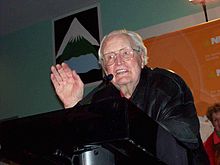- 1 2 3 Martin, Sandra (2008-03-10). "DONALD C. MACDONALD: 1913-2008: 'Best premier Ontario never had,' Donald C. MacDonald dies at 94". The Globe and Mail . Toronto: CTVglobemedia. pp. A10. Archived from the original on 2008-03-13. Retrieved 2009-12-20.
- 1 2 3 4 5 6 7 MacDonald, Donald C. (1998). The Happy Warrior: Political Memoirs (2 ed.). Toronto: Dundurn Press. ISBN 1-55002-307-1.
- 1 2 3 4 5 6 7 8 9 10 11 12 Morley, John Terence (1984). Secular Socialists the CCF/NDP in Ontario, a Biography (1st ed.). Kingston-Montreal: McGill-Queen's University. ISBN 0-7735-0390-0.
- 1 2 3 4 5 Goldblatt, Murray (1971-04-24). "Bloc of union delegates aids establishment to fend off Waffle drive for party offices". The Globe and Mail . Toronto: CTVglobemedia. p. 10.
- ↑ "Donald C. MacDonald, C.M., O.Ont., M.A., LL.D." Honours, Order of Canada. Governor General of Canada. 2003-10-24. Retrieved 2009-09-08.
Bibliography
- Azoulay, Dan (1999). Azoulay, Dan (ed.). A Desperate Holding Action: The Survival of the Ontario CCF/NDP, 1948-1964. Canadian political parties:historical readings. Toronto: Irwin Publishing. pp. 342–363. ISBN 0-7725-2703-2.
- MacDonald, Donald C. (1998). The Happy Warrior: Political Memoirs, 2nd Ed. Toronto, ON, Canada: Dundurn Press. ISBN 1-55002-307-1. Forewords by Desmond Morton, Howard Hampton.
- Morley, John Terence (1984). Secular Socialists the CCF/NDP in Ontario, a Biography (1st ed.). Kingston-Montreal: McGill-Queen's University. ISBN 0-7735-0390-0.
External links
Donald C. MacDonald | |
|---|---|
 | |
| Leader of the Ontario CCF and NDP | |
| In office 1953–1970 |
| Leaders | |
|---|---|
| Leadership elections | |
| Governments | |
| Shadow cabinets | |